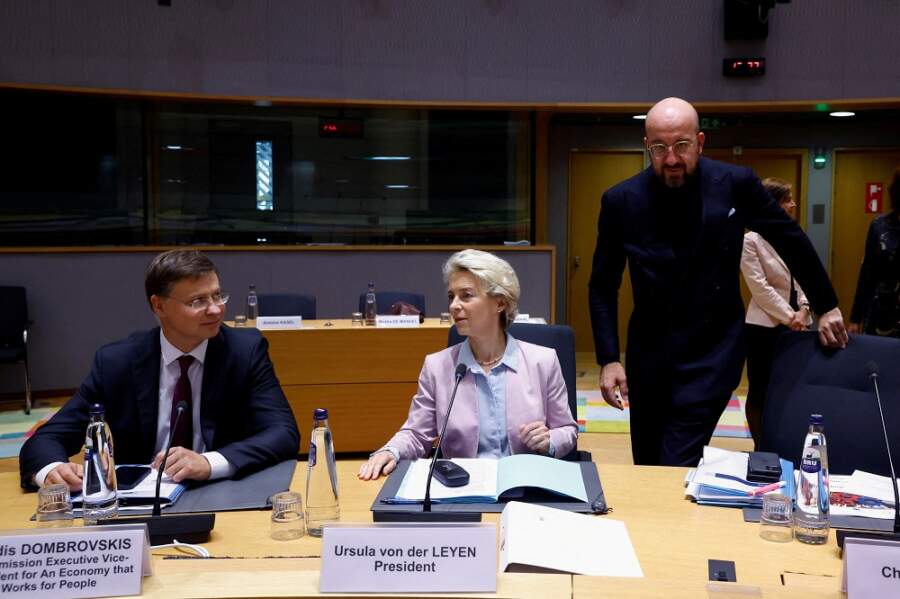
By Philip Blenkinsop
BRUSSELS (Reuters) – The European Union is aiming to enact up to five trade deals in record time to ensure its future as a clean tech leader, by securing supplies of key raw materials, increasing markets for green exports and reducing its reliance on China.
A big EU trade push is a key part of its “Green Deal Industrial Plan” to ensure the bloc remains a manufacturing hub able to compete with the likes of the United States, whose new green subsidies law has concerned many in Europe.
European Commission President Ursula von der Leyen will present the plan on Wednesday.
Trade Commissioner Valdis Dombrovskis said multiple economic shocks, including the COVID-19 pandemic, Russia’s invasion of Ukraine and increased protectionist tendencies, had sparked an EU-wide debate about competitiveness.
“This debate has evolved into a wider reflection on whether the EU should remain outward-looking or turn further inward,” he told lawmakers, adding he believed the bloc drew its strength from being a “trading superpower”.
A year ago, EU diplomats said France, which then held the six-month rotating presidency of the EU, halted moves to progress trade deals lest concerns about globalisation disturb its presidential and legislative elections.
Open trade advocates Sweden and Spain, the current and next EU presidency holders, both hope to revive the trade push.
Together, the five deals being targeted could be worth about 10 billion euros ($10.9 billion) to the EU and help cement its market share and influence in the Americas and Asia-Pacific region, according to Hosuk Lee-Makiyama, director of trade think tank ECIPE.
Andre Sapir, a senior fellow at the Bruegel think tank, said the EU’s free trade agreements often came in waves, with more protectionist periods in between.
“Geopolitical developments and access to raw materials are providing the extra impetus now,” he said.
LITHIUM LEADERS CHILE, AUSTRALIA
Von der Leyen has said Europe needs to build up its own refining of raw materials and work with partners including the United States to strengthen supply chains and reduce dependence on China, which dominates rare earth and lithium processing.
The U.S. Inflation Reduction Act, which seeks to make the United States a leader in green technology, possibly at Europe’s expense, has intensified this need.
The Commission, which negotiates trade agreements on behalf of the 27 EU members, highlights that an updated deal with Chile it agreed in December could give Europe better access to lithium, a key component of vehicle batteries.
Chile is the world’s second-largest lithium producer.
The EU sees similar promise from another trade agreement with Australia, the largest lithium producer, which both sides believe could be concluded mid-year.
LATIN AMERICA OPENINGS
The EU executive has negotiated a number of trade deals, but the process of approving them has been painfully slow.
The bloc’s most recently implemented trade agreements, with Singapore and Vietnam, took four to five years to clear the European Parliament and EU governments, although the fast-tracked EU-Japan accord took 18 months.
Agreements with Mexico from 2018 and with the Mercosur bloc of Argentina, Brazil, Paraguay and Uruguay from 2019 are on hold.
Now, the European Parliament and EU governments may approve as early as mid-year a deal struck only in June 2022 with New Zealand and follow that up with a green light for the Chile agreement, EU officials say.
Consent could follow for the 2018 agreement with Mexico, assuming Mexico accepts splitting the deal in two, part of which could be fast-tracked in Brussels. The planned Australia deal could also be pushed through if it is agreed by mid-2023.
“Finalising the free trade agreements, broadening our network of free trade agreements is going to be high on our agenda this year and next,” Dombrovskis told a briefing earlier this month.
The Commission, which negotiates trade agreements for the 27 EU members, said Luiz Inacio Lula’s defeat of Jose Bolsanaro in October’s Brazilian presidential election had created a window of opportunity to revisit the Mercosur agreement.
“We cannot miss the chance with Lula,” a senior Spanish diplomat said.
The deal has been on hold due to EU concerns about Amazon deforestation and demands for sustainability commitments. Lula has vowed to tackle rainforest deforestation, but trade analysts say reviving the EU-Mercosur deal will still require tough negotiations.
“It was certainly impossible for the EU with Bolsanaro, but it’s also complicated now for the Mercosur side,” Sapir said.
($1 = 0.9184 euros)
(Reporting by Philip Blenkinsop; Editing by Catherine Evans)


